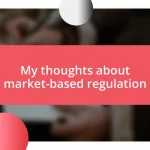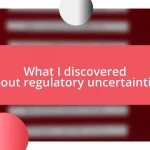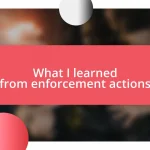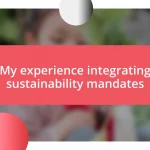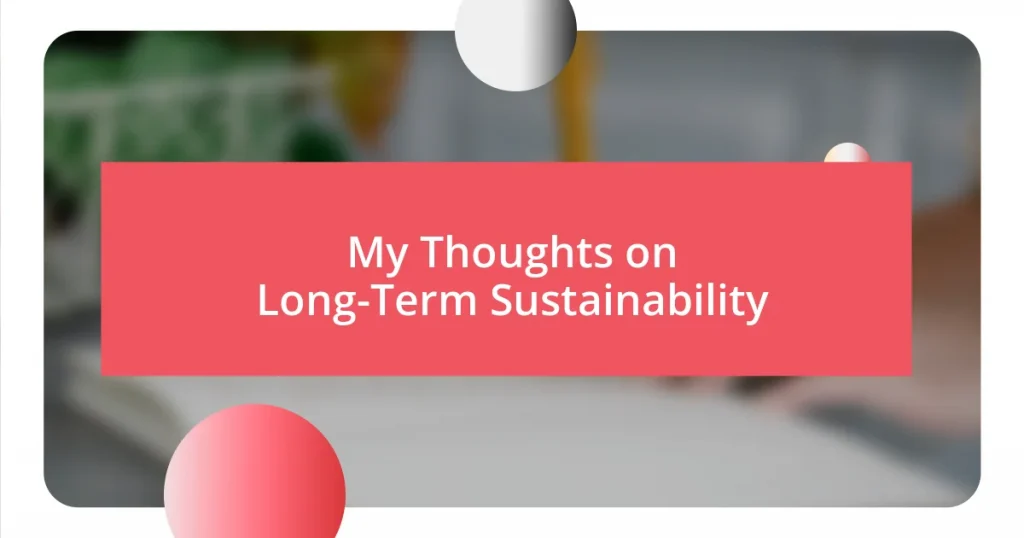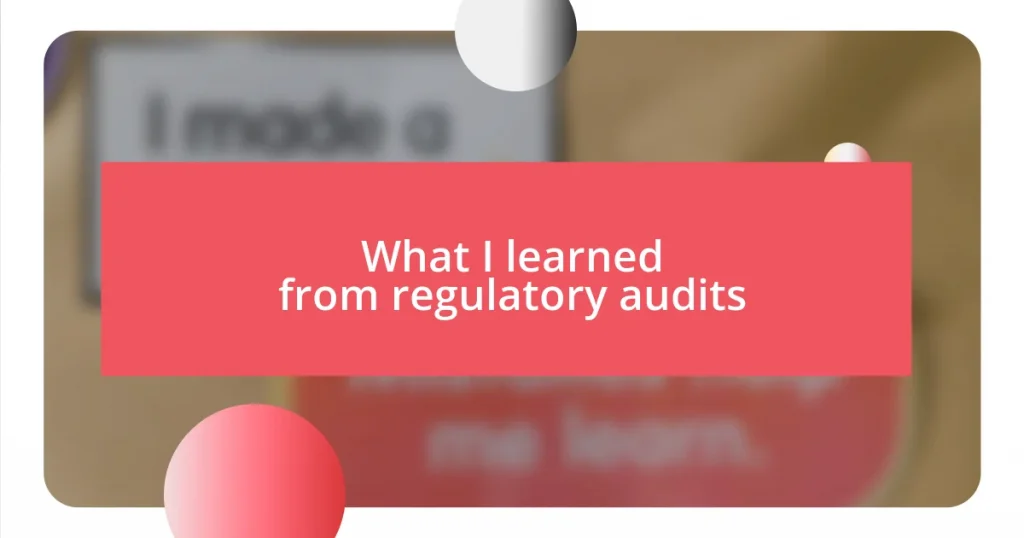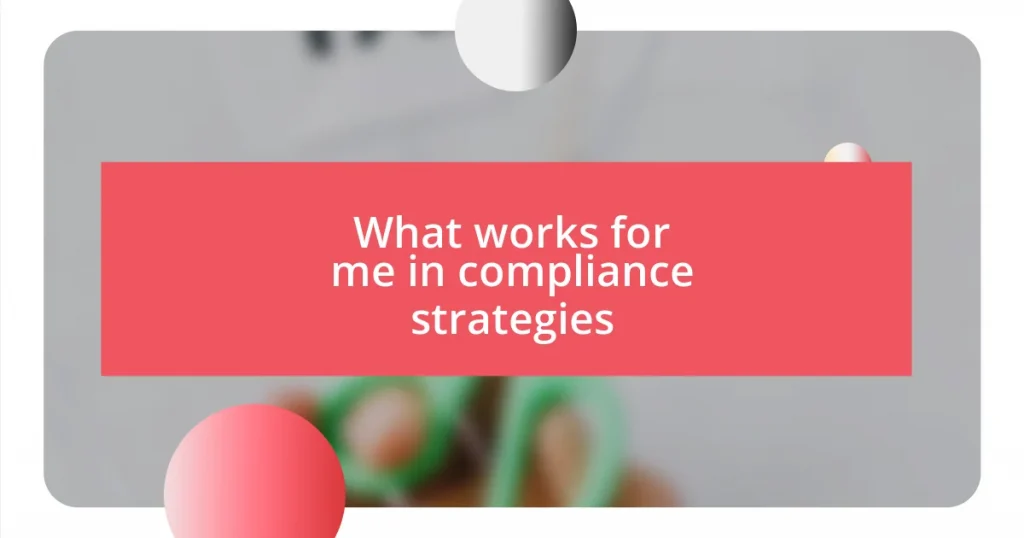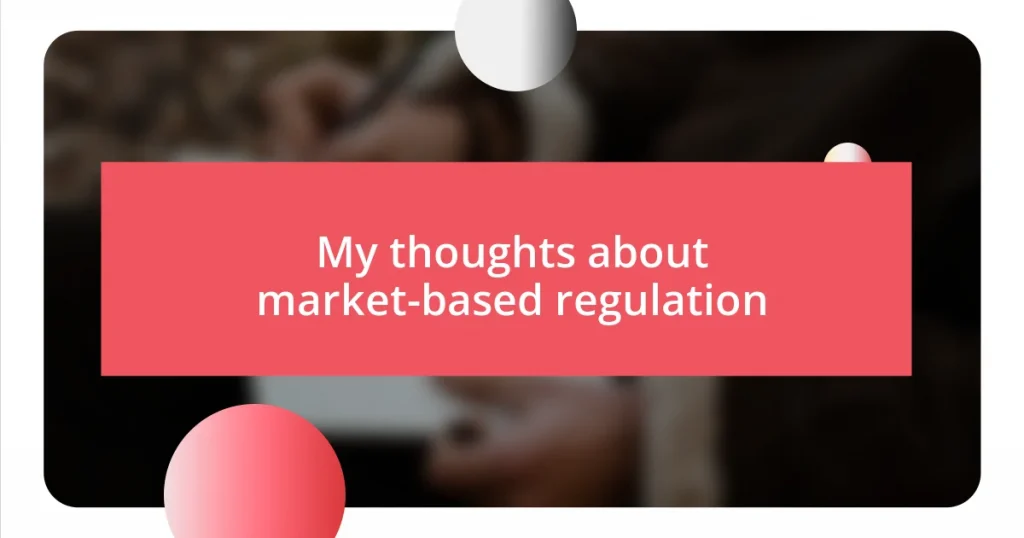Key takeaways:
- Long-term sustainability revolves around the responsible management of resources to meet current needs while ensuring future generations can do the same.
- Key principles include conservation, equity, and resilience, emphasizing the interconnectedness of environmental health and social justice.
- Challenges such as reliance on fossil fuels, resource depletion, and societal inequality must be addressed through collective action and innovative strategies like the circular economy.
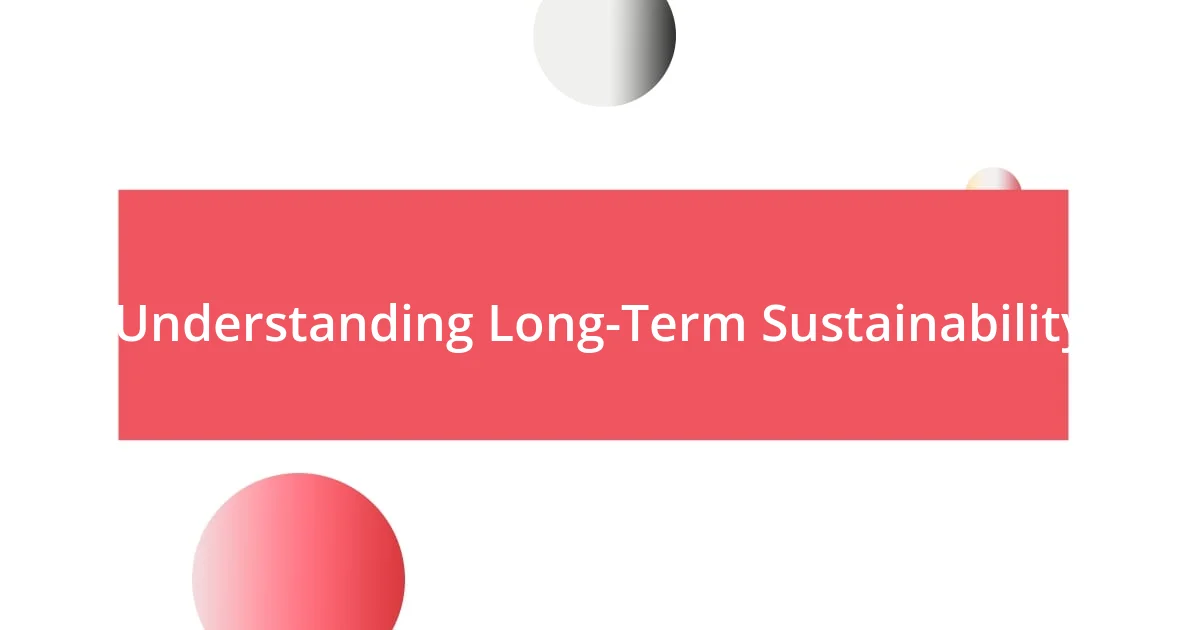
Understanding Long-Term Sustainability
Long-term sustainability is about meeting our current needs without compromising the ability of future generations to meet theirs. I often think about my childhood visits to national parks—those experiences shaped my appreciation for preserving our planet. When I see a majestic tree or a pristine lake, I can’t help but wonder how future generations will connect with nature if we don’t act responsibly today.
This concept challenges us to rethink our relationship with resources. For instance, I recall a moment when I chose to repair a favorite pair of shoes instead of buying new ones. It felt like a small act, yet it struck me how personal choices can ripple out to larger societal implications. Isn’t it fascinating how even minor adjustments in our consumption habits can contribute to a healthier, sustainable future for everyone?
Understanding long-term sustainability means looking beyond immediate benefits and recognizing the interconnectedness of our actions. I often ask myself how my daily choices impact the environment—whether it’s the food I eat or the energy I consume. By fostering a culture of sustainability, we can create a brighter future. How can we encourage others to join us on this journey?
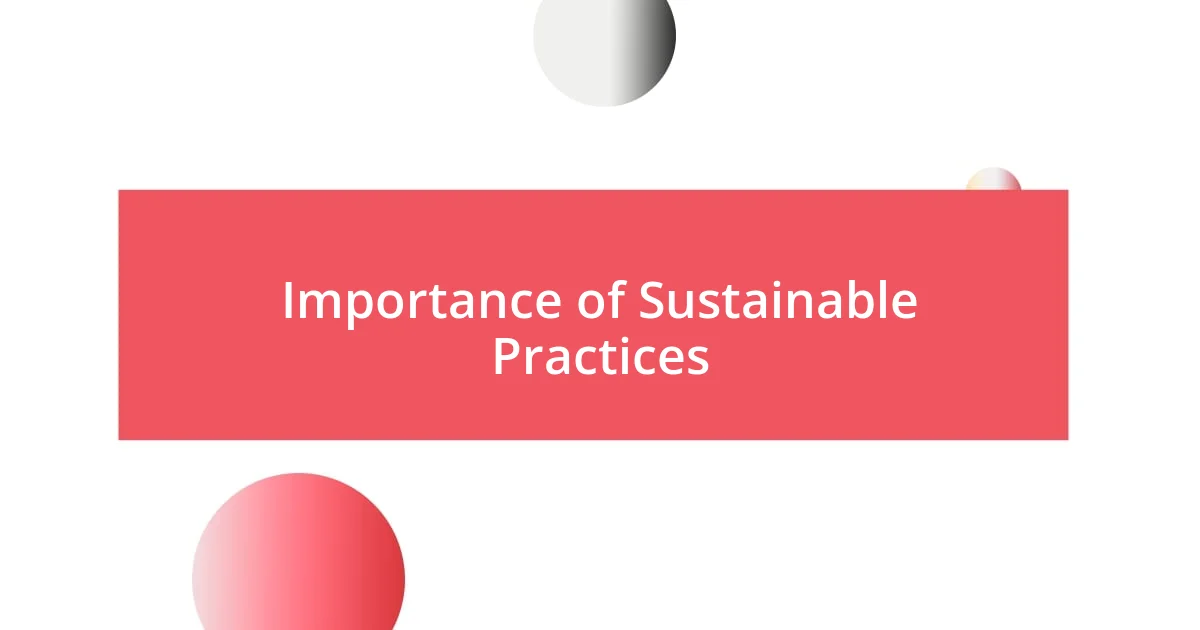
Importance of Sustainable Practices
Sustainable practices are vital for preserving our planet and ensuring resources remain available for future generations. I once volunteered for a local clean-up event, and it was a real eye-opener. Seeing the difference we made to that beach in just a few hours highlighted how collective effort can rejuvenate our environments. Every little action counts, reinforcing the idea that sustainability isn’t just a buzzword—it’s a necessity.
Here are some key reasons why sustainable practices matter:
- Resource Conservation: By using resources wisely, we can reduce waste and ensure availability for years to come.
- Ecosystem Protection: Sustainable practices help maintain biodiversity and protect habitats crucial for wildlife.
- Economic Advantages: Implementing sustainable strategies can lead to cost savings and new job opportunities in green industries.
- Health Benefits: Eco-friendly practices lead to cleaner air and water, ultimately improving public health.
- Community Resilience: Sustainable communities are better equipped to handle environmental challenges and social changes.
When I reflect on these points, it reminds me of a time when I switched to reusable products. Initially, it felt like an extra hassle, but eventually, it became second nature. Plus, knowing I’m contributing to a larger cause gives me a sense of pride and connection to my community.
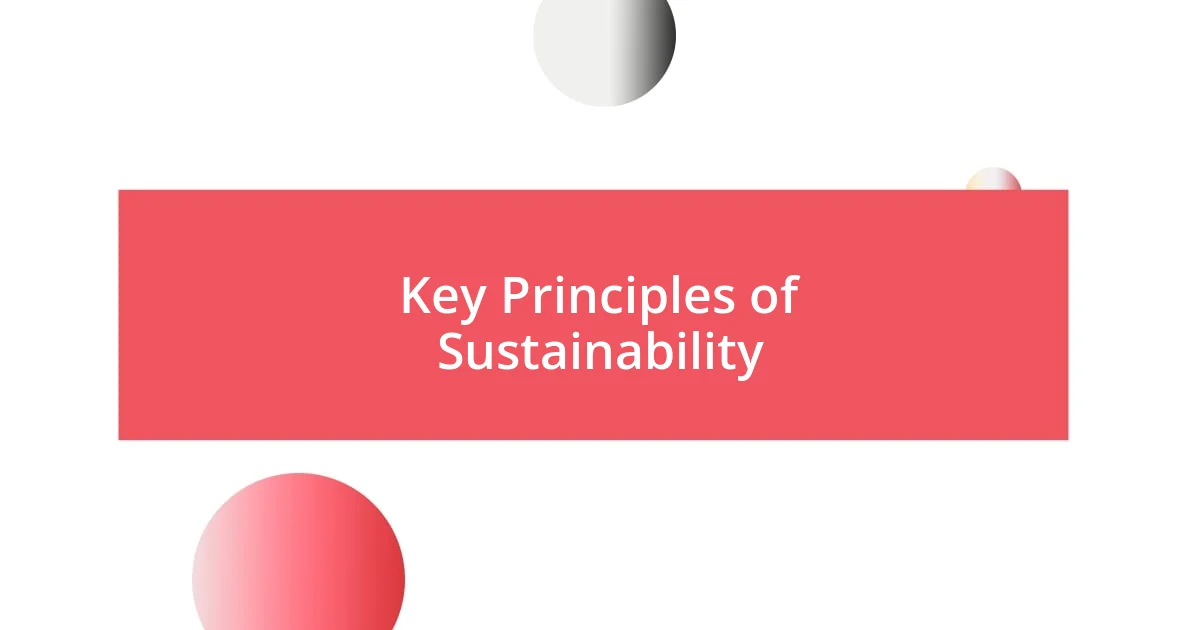
Key Principles of Sustainability
The key principles of sustainability revolve around conservation, fairness, and mindful resource management. I remember when I first learned about the concept of a circular economy. It’s all about designing products with their entire lifecycle in mind—what a transformative idea! Imagining a world where waste is minimized and materials are endlessly repurposed sparked my curiosity and made me rethink how we consume. It’s empowering to realize that our choices, however small, can drive significant change.
Another essential principle is equity, which emphasizes the fair distribution of resources and opportunities. I once attended a seminar on environmental justice that profoundly impacted my understanding of sustainability. Witnessing firsthand the struggles of communities facing pollution due to industrial activities was eye-opening. It’s a reminder that sustainability isn’t only about protecting nature but also about advocating for social equity. When we view sustainability through this lens, it becomes a far more inclusive and urgent mission, doesn’t it?
Lastly, the principle of resilience teaches us the importance of adapting to and preparing for change. I recall a hiking trip where the trail was suddenly washed out by heavy rains, forcing us to find a new path. That experience mirrored life’s unpredictability and the need for sustainable systems that can withstand environmental shifts. When we build resilience into our communities and economies, we not only safeguard our future but also enhance our ability to thrive amidst uncertainty.
| Principle | Description |
|---|---|
| Conservation | The responsible management of natural resources to prevent depletion and ensure availability for future generations. |
| Equity | Fair distribution of resources and opportunities, emphasizing that sustainability must include social justice and environmental fairness. |
| Resilience | The ability of systems to adapt to change and withstand environmental shocks, ensuring continuity and stability. |
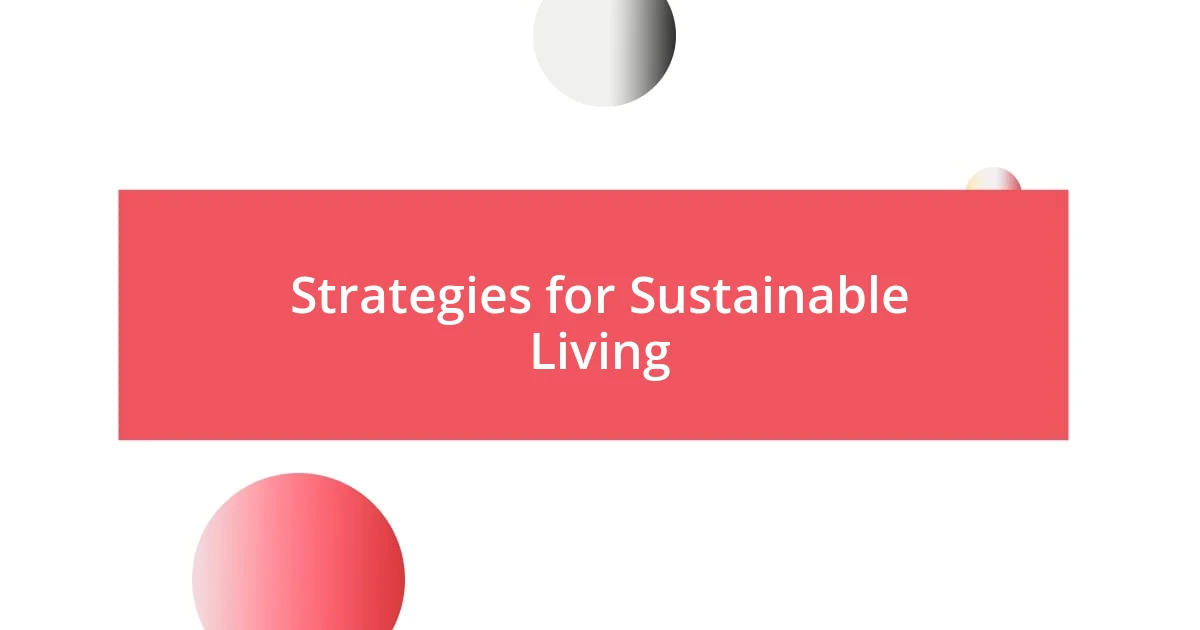
Strategies for Sustainable Living
When I think about strategies for sustainable living, one of the first things that comes to mind is reducing single-use plastics. A few months ago, I decided to take a small but significant step by carrying a reusable water bottle everywhere I go. It’s astonishing how quickly those little changes add up! Having that bottle has not only cut down my plastic consumption but also opened conversations with others about sustainability. Have you ever considered how your daily choices could inspire change in those around you?
Another effective strategy is to embrace plant-based eating. I made the transition about a year ago, and I was pleasantly surprised by the variety of delicious meals I could create. Initially, I thought it would be limiting, but I found that exploring plant-based recipes opened a whole new world of flavors. Plus, knowing that I’m contributing to lower carbon emissions feels incredibly rewarding. Have you thought about how your dining choices could impact the environment?
Additionally, supporting local businesses can significantly strengthen community sustainability. I remember a time when I explored my local farmers’ market. The atmosphere was vibrant, filled with fresh produce and enthusiastic vendors. Not only did I get to enjoy nutritious food, but I also connected with my community. This choice not only benefits my health but also helps reduce transportation emissions. By shopping locally, we can cultivate relationships and nurture a sense of belonging. Have you explored your local options lately? You might be amazed by what’s available right in your own backyard!
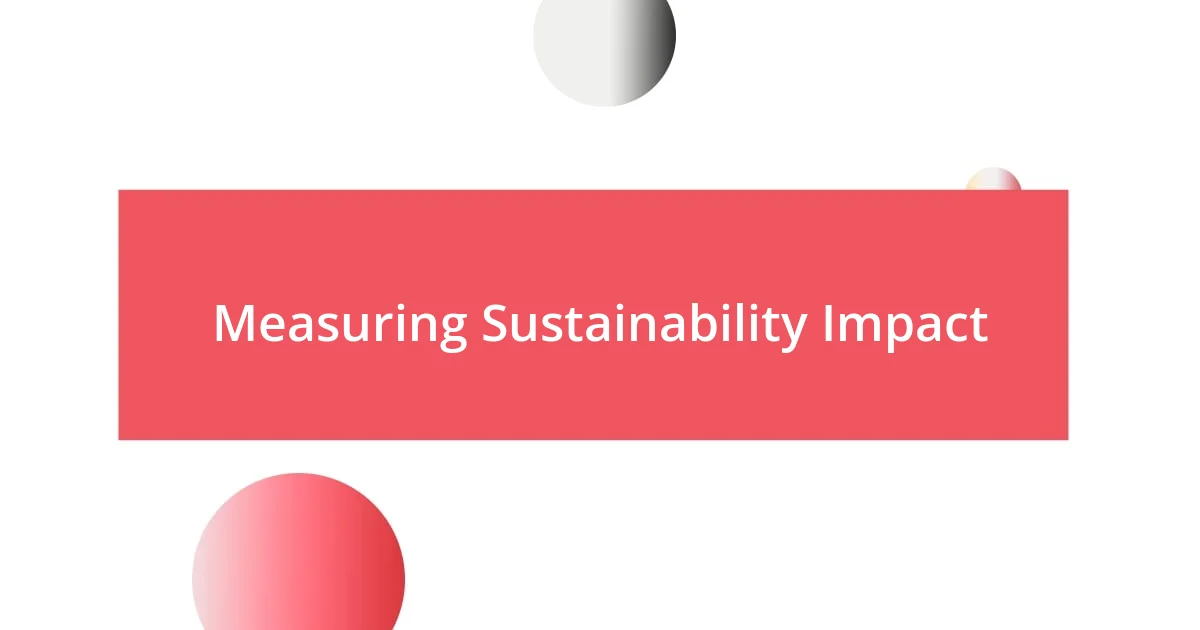
Measuring Sustainability Impact
Measuring sustainability impact involves evaluating how our actions and policies influence the environment, economy, and society. I recall volunteering for a community garden project where we tracked the amount of produce harvested. The simple act of recording our yield not only showcased our progress but also demonstrated the direct benefits of urban gardening, like enhancing biodiversity and providing fresh food to local families. Have you ever thought about how quantifying our efforts could motivate us to do even more?
One key method for measuring impact is through sustainability metrics, such as carbon footprint assessments. I remember attending a workshop on greenhouse gas calculations that completely changed my perspective. It made me realize how everyday choices, like driving less or using energy-efficient appliances, can lead to meaningful reductions in emissions. Those numbers spoke volumes, didn’t they? It’s tangible evidence that can drive both personal accountability and collective action.
Additionally, feedback from our community is invaluable. In a recent initiative, we collected surveys on local environmental programs to gauge their effectiveness. The responses were heartfelt, revealing not just statistics but stories of changed mindsets and behaviors. Those narratives brought the data to life and emphasized the importance of listening to the people we aim to help. Have you experienced a moment when feedback transformed your approach? It’s a powerful reminder that sustainability is a collaborative journey, and every voice matters.
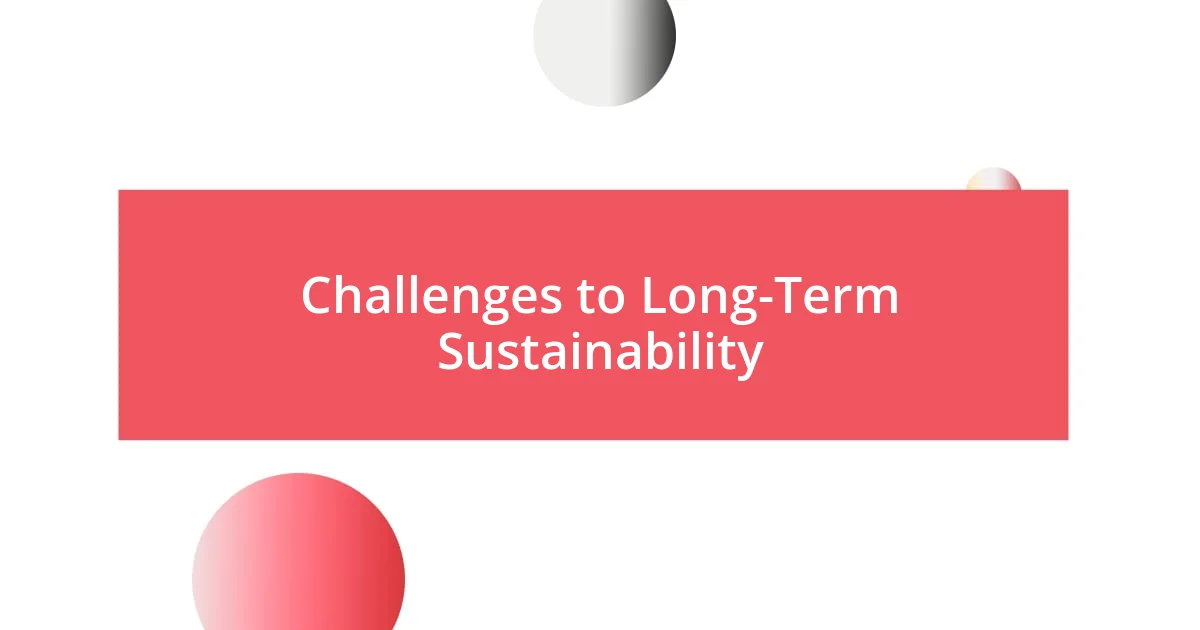
Challenges to Long-Term Sustainability
One of the most significant challenges to long-term sustainability is the widespread reliance on fossil fuels. I remember when I attended a climate rally a couple of years ago, and the energy in the air was palpable. Yet, amidst the excitement, I couldn’t help but feel overwhelmed by the sheer scale of the fossil fuel industry’s hold on our economy. Have you ever thought about how deeply embedded these energy sources are in our daily lives? Transitioning to renewable energy requires not just technological innovation but a collective shift in mindset that can be quite daunting.
Another hurdle is the issue of resource depletion. Reflecting on my experiences hiking in national parks, I’ve seen firsthand the stark contrast between areas of responsible management and those suffering from overuse. It’s heartbreaking to witness the deterioration of natural landscapes that rely on balanced ecosystems. Are we doing enough to protect these vital resources for future generations? The urgency to strike a balance between consumption and conservation is more pressing than ever, and it requires both individual and collective action.
Additionally, societal inequality plays a critical role in sustainability efforts. I recall volunteering at a local shelter and hearing stories from individuals facing food insecurity; it opened my eyes to how deeply interconnected our issues are. It became clear that sustainability isn’t just about environmental practices; it’s also about ensuring everyone has access to the resources they need to thrive. How can we promote sustainable practices if we neglect the socio-economic barriers that many face? Tackling these disparities is essential if we genuinely want to build a sustainable future for all.
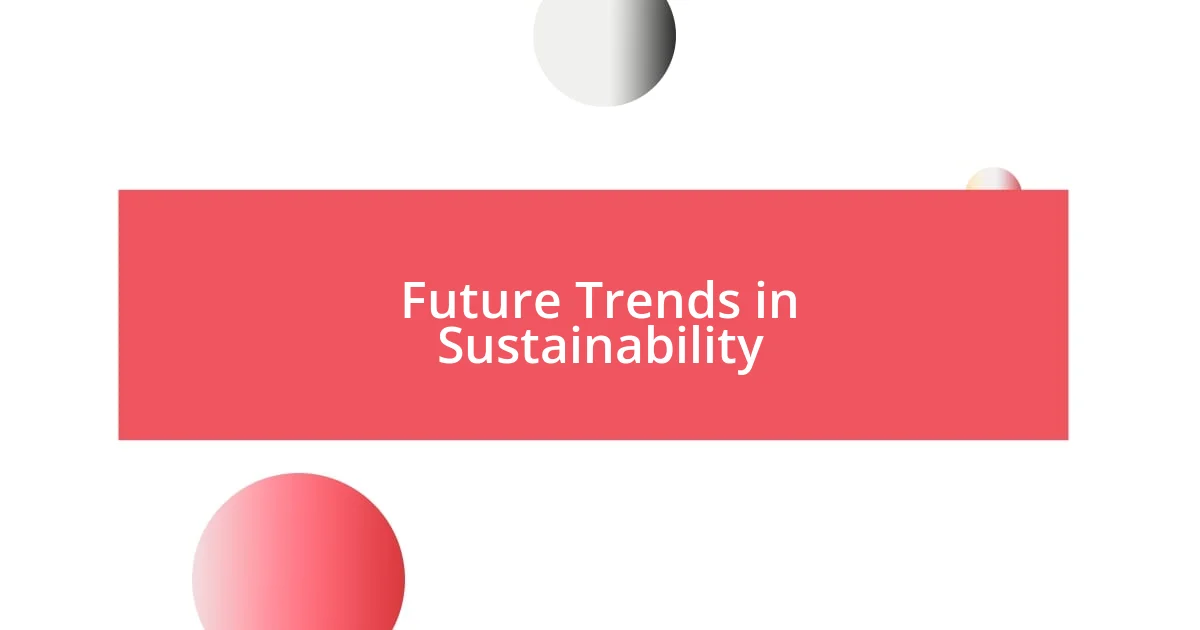
Future Trends in Sustainability
One upcoming trend in sustainability that excites me is the rise of circular economy practices. I recently read about a local startup that turns discarded plastics into stylish furniture. This innovative approach not only reduces waste but also shifts our mindset from a linear “take-make-dispose” model to one where materials are continuously reused. Have you ever looked at something deemed worthless and imagined its second life? That’s the magic of circularity; it challenges us to see potential everywhere.
Technology will also play a crucial role in the future of sustainability. I recall attending a tech fair where I saw smart home devices that optimize energy use, adjusting heating or cooling based on occupancy. This not only saves money but also minimizes energy waste. Doesn’t it make you wonder how much we could reduce our carbon footprint with just a few modifications in our everyday tech? Embracing these advancements can lead to substantial sustainability gains.
Lastly, the role of community initiatives is pivotal in shaping sustainable futures. I once joined a workshop focused on local permaculture practices, where we learned to work with nature rather than against it. The sense of unity and shared purpose was palpable; we weren’t just learning about sustainability; we were living it together. How can we inspire more people to join these movements? When we come together with common goals, we amplify our impact and create stronger, more resilient communities ready for a sustainable future.


